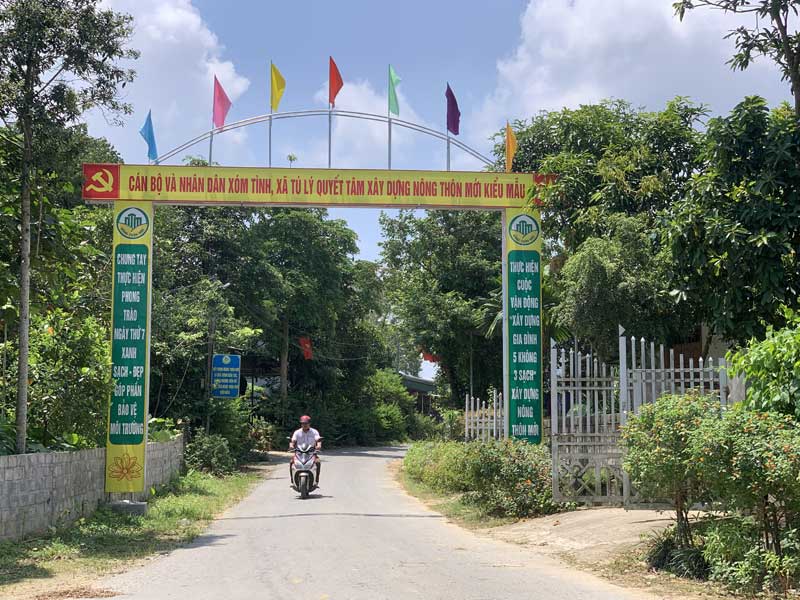
(HBO) - The campaign on enhancing unity for a civilised lifestyle has been effectively implemented in Tu Ly commune (Da Bac district), contributing to economic development and locals’ spiritual lives.
 Intra-commune lanes in Tu Ly commune (Da Bac district)
are expanded and concretised, giving a facelift to the residential areas.
Intra-commune lanes in Tu Ly commune (Da Bac district)
are expanded and concretised, giving a facelift to the residential areas.
Dao quan chet ethnic people are the
majority in Ma hamlet. Its lanes have been concretised, with flower beds running
along. Head of the hamlet Duong Kim Tuat said thanks to economic development,
local residents took part in training courses on plant cultivation and animal
husbandry to apply in production for high economic results.
Average annual per capita income there hits
29 million VND (about 1,250 USD). There are no depilated houses in the hamlet which
has been recognised as a civilised residential area for many years.
Tu Ly, formed after the merger of Tu Ly and
Hao Ly communes, is now home to 12 hamlets, 1,460 households, and over 6,100
residents of five ethnic groups of Muong, Kinh, Dao, Tay and Thai.
The campaign on enhancing unity for a
civilised lifestyle has been viewed as a driving force of the local
socio-economic development, people’s spiritual lives, and traditional cultural
conservation. The Party committee and authorities of the commune have launched
various activities to foster the campaign in line with the building of new-style
rural areas.
The steering board of the campaign in the
commune frequently reviews, amends and supplements regulations in a more
suitable manner.
Criteria of the campaign on building
civilised families, villages and residential areas have been disseminated to
every village and hamlet. The registration, evaluation and nomination of civilised
families is carried out in an open and transparent manner.
The commune to date has nearly 90 percent
of families, 11 out of the 12 hamlets recognised as civilised; Hao Tan and Tinh
as new-style residential areas; three gardens in Tan Ly, Hao Tan and Tinh as model
ones.
Due attention has been paid to
infrastructure, as the commune has two large stadiums, two multipurpose houses,
and all hamlets zoned off areas for people to attend art and sporting events./.
With an increasingly vibrant and widespread emulation movement aimed at building cultured residential areas and cultured families, Yen Thuy District has been making steady progress toward improving both the material and spiritual well-being of its people, while fostering a civilized, prosperous, beautiful, and progressive community.
Once lacking recreational spaces and community facilities, Residential Group 2 in Quynh Lam Ward (Hoa Binh City) has recently received attention for the construction of a new, spacious, and fully equipped cultural house. The project followed the model of state support combined with public contributions in both labor and funding.
The "All people unite to build cultural life" movement, which has been effectively integrated with Kim Boi district’s socio-economic development goals, is fostering a lively spirit of emulation across local residential areas, hamlets, villages, public agencies, and enterprises. In addition, through the initiative, traditional cultural values are being preserved and promoted, while community solidarity and mutual support in poverty reduction and economic development are being strengthened.
A working delegation of the Hoa Binh provincial People’s Committee led by its Permanent Vice Chairman Nguyen Van Toan on June 11 inspected the progress of a project to build the Mo Muong Cultural Heritage Conservation Space linked to tourism services in Hop Phong commune, Cao Phong district.
Born and growing in the heroic land of Muong Dong, Dinh Thi Kieu Dung, a resident in Bo town of Kim Boi district, in her childhood was nurtured by the sweet lullabies of her grandmother and mother. These melodies deeply imprinted on her soul, becoming an inseparable part of her love for her ethnic group's culture. For over 20 years, this love for her hometown has driven Dung to research, collect, and pass down the cultural values of the Muong people to future generations.
In the final days of May, the Ethnic Art Troupe of Hoa Binh Province organized performances to serve the people in remote, mountainous, and particularly disadvantaged areas within the province. These were not just ordinary artistic shows, but they were the meaningful journeys aimed at spreading cultural values, enhancing the spiritual life of the people and contributing to the preservation of ethnic minority cultural identities.



 Intra-commune lanes in Tu Ly commune (Da Bac district)
are expanded and concretised, giving a facelift to the residential areas.
Intra-commune lanes in Tu Ly commune (Da Bac district)
are expanded and concretised, giving a facelift to the residential areas.